Recommended Reads for Authors
Reading fuels writing: great authors teach us to craft sharper prose. By studying the best, we unlock the secrets that help elevate our own narratives.
Here, I've curated some of my favourite books, each with a mini review, a key quote, and some ideas that authors might take away. They're in no particular order!

The Splendid and the Vile by Erik Larson

Mini Review
Larson’s riveting account of Churchill’s Blitz-year weaves diaries and declassified files into a saga of defiance. His prose pulsates with cinematic urgency, turning history into intimate drama.
Key Quote
'He stood alone … his voice a beacon through the fog of war'
For Authors
Larson’s Vonnegut-inspired arc, layering chaos with ironic triumphs, offers a masterclass in plotting. Use it to craft emotionally resonant timelines in your novel.
Wifedom by Anna Funder

Mini Review
Funder unearths Eileen O’Shaughnessy’s hidden role in Orwell’s work through a bold mix of letters, fiction, and feminist critique. It’s a searing reclamation of a co-creator’s spark.
Key Quote
'She typed his words, but her own were erased'
For Authors
Funder’s hybrid structure – blending fact with imagined scenes – teaches how to amplify marginalised voices. Apply it to deepen character backstories with subversive depth.
The Mist by Ragnar Jónasson
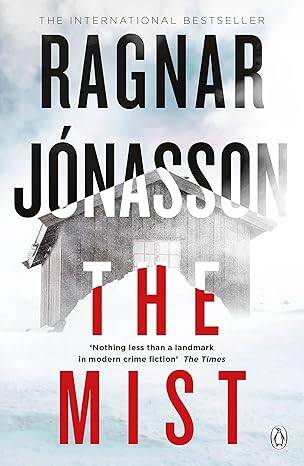
Mini Review
In 1980s Iceland, detective Hulda probes a girl's disappearance amid a brutal Christmas storm, shadowed by a farmhouse nightmare of isolation and deceit. Jónasson’s taut noir builds dread through remorseless revelations, blending personal tragedy with Nordic chill.
Key Quote
'The mist descended, clouding judgment, blurring the line between safety and ruin'
For Authors
The series’ reverse chronology, unspooling Hulda’s life, crafts escalating doom and hindsight twists. Experiment with it for thrillers, layering foreshadowing to heighten emotional stakes and reframe past events.
The Scapegoat by Daphne du Maurier
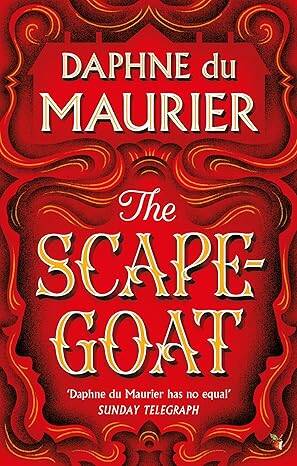
Mini Review
A British academic swaps lives with his French doppelgänger, a dissolute count, plunging into a crumbling chateau rife with family feuds and hidden scandals. Du Maurier's taut suspense unmasks the fragility of identity amid moral quicksand.
Key Quote
'In his shadow, I became the man I feared to be'
For Authors
Du Maurier's doppelgänger device fuels psychological tension. Borrow it for character studies, using identity swaps to expose suppressed desires and drive plot through ethical dilemmas.
The Stranger's Child by Alan Hollinghurst

Mini Review
Spanning a century from Edwardian summers to 2008, Hollinghurst traces a World War I poet's fading legacy through biographers, lovers, and family secrets. His elegant prose dissects memory's distortions, blending sensuality with the ache of lost histories.
Key Quote
'The poem lingered, a stranger's whisper across the years'
For Authors
Hollinghurst's multi-era structure, echoing across generations, crafts irony through evolving perspectives. Apply it to ensemble sagas, using unreliable narrators to explore how desire and time reshape personal myths.
Here We Are by Graham Swift

Mini Review
Swift's slim tale follows a fading magician, his assistant, and their compere on 1959 Brighton Pier, unravelling a wartime secret that reshapes their lives. Told through compressed flashbacks and quiet revelations, it's a poignant nod to post-war illusions and enduring love.
Quote
'The trick was not in the vanish, but in what lingered after'
For Authors
Swift's compressed narration (distilling decades into vignettes) builds emotional resonance without sprawl. Use it for non-linear backstories, layering ordinary lives with subtle magic to heighten themes of loss and reinvention.
The Valley of Unknowing by Philip Sington
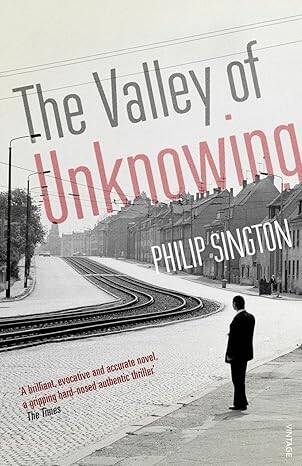
Mini Review
In 1980s East Berlin, blocked novelist Bruno Krug stumbles on a rival's manuscript that eerily mirrors his unwritten sequel, igniting a tangled web of plagiarism, romance, and Stasi intrigue. As Bruno woos a Western violinist and smuggles the book West, the Iron Curtain's chill seeps into every stolen glance. Sington's taut prose captures a regime's suffocating grip with thriller precision.
Quote
'His manuscript mirrored mine, a shadow I couldn’t shake'
For Authors
The novel's metastory highlights mirroring techniques for building suspense. Borrow it to weave thematic doubles in your drafts, heightening irony and tension through parallel narratives.
The Magician by Colm Tóibín

Mini Review
Colm Tóibín conjures Thomas Mann's shadowed life across two world wars, from his bourgeois youth to Nobel glory and exile's bite. Repressed desires clash with rising fascism as Mann pens Death in Venice amid family fractures and Hitler's shadow. Tóibín's pared-back style peels away the artist's mask, revealing a man haunted by secrets.
Quote
'His pen hid desires the world couldn’t see'
For Authors
Tóibín’s restrained historical layering models economical world-building. Infuse personal subtext into era-spanning tales, letting silences drive character arcs.
The Daughter of Time by Josephine Tey
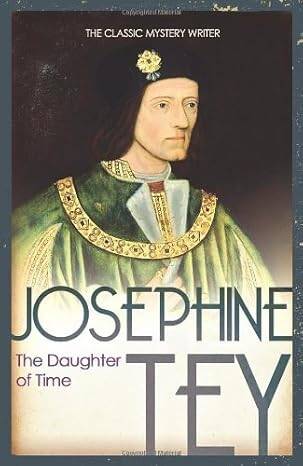
Mini Review
Bedridden Scotland Yard inspector Alan Grant probes Richard III's villainy from hospital, debunking Tudor myths through archival sleuthing. Tey's cerebral whodunit blends history with detective flair, questioning how legends distort facts.
Quote
'Truth is the daughter of time, not authority'
For Authors
Tey's armchair investigation – using physiognomy and sources for revisionism – models intellectual plotting. Adapt it for meta-mysteries, interrogating 'official' narratives to add layers of irony and thematic depth to historical fiction.
Gabriel's Moon by William Boyd
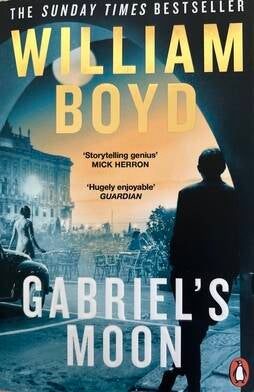
Mini Review
William Boyd thrusts travel writer Gabriel Dax into 1960s Cold War shadows after taping Congo's Patrice Lumumba naming his assassins. Recruited by MI6 for a Spanish art heist laced with betrayal, Gabriel grapples insomnia, sibling rifts, and a handler's allure across continents. Boyd's globe-trotting zest pulses with wry espionage twists.
Quote
'One tape, one name, and the world turned against him'
For Authors
Boyd’s reluctant-hero arc crafts stakes from mundane starts. Ground high intrigue in psychological scars for layered, propulsive thriller reveals.
Strangers on a Train by Patricia Highsmith
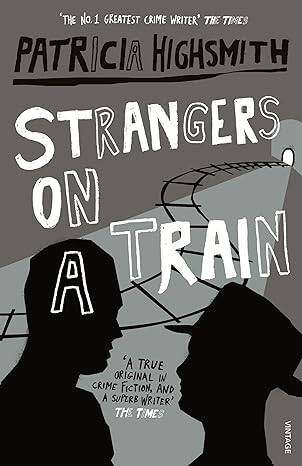
Mini Review
Architect Guy Haines meets obsessive Bruno on a train; Bruno murders Guy's wife, demanding reciprocity in patricide. Highsmith's chilling psychothriller dissects guilt's corrosive pull through homoerotic tension and moral descent.
Quote
'Our perfect crime, stranger – yours for mine'
For Authors
Highsmith's 'criss-cross' scheme of interlocked fates via chance amplifies psychological dread. Employ it for thrillers, blurring victim-perpetrator lines to explore ethical ambiguity and build claustrophobic suspense.
A Month in the Country by J. L. Carr
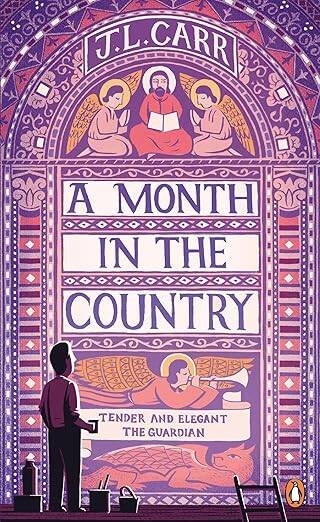
Mini Review
World War I survivor Tom Birkin restores a Yorkshire church mural, unearthing medieval secrets and quiet romances amid pastoral idyll. Carr's elegiac novella captures fleeting joy against war's scars with fluid, quiet prose.
Quote
'That month I began to heal, under summer's gentle hand'
For Authors
Carr's dual restorations (art and psyche) interlace for thematic symmetry. Draw on it for healing arcs, using sepia-toned flashbacks to contrast trauma with renewal in character-centred narratives.
Small Things Like These by Claire Keegan
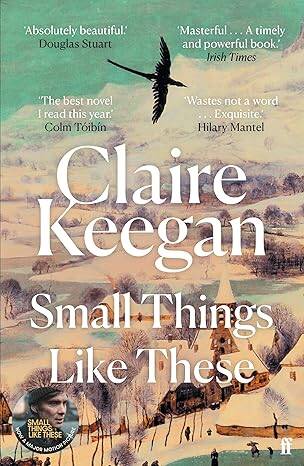
Mini Review
In 1985 Ireland, coal merchant Bill Furlong uncovers a girl's plight at a Magdalene laundry, confronting complicity in a web of silence and faith. Keegan's novella distils quiet heroism into crystalline prose, exposing institutional cruelty through one man's dawning resolve.
Quote
'Was there any point in being alive without helping one another?'
For Authors
Keegan's minimalist immersion, in which every scene freighted with implication, crafts moral intensity in sparse forms. Use it for novellas, layering sensory details to amplify ethical pivots without overt exposition.
Doctor Zhivago by Boris Pasternak

Mini Review
Poet-physician Yuri Zhivago endures revolution and civil war, his affair with Lara a quiet rebellion against chaos. Pasternak's lyrical epic interweaves fate, poetry and history in a hymn to life's endurance.
Quote
'Amid the storm, love bloomed like a fragile garden'
For Authors
Pasternak's poetic interludes infuse prose with lyricism. Integrate it for epic scopes, using personal vignettes to humanise grand events and evoke spiritual resilience.
Babylon Berlin by Volker Kutscher
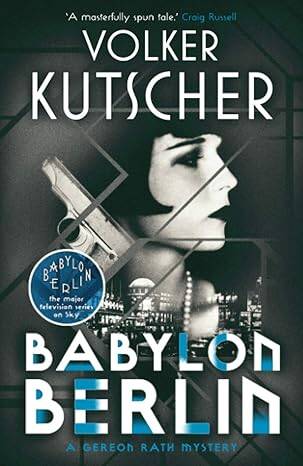
Mini Review
Detective Gereon Rath navigates 1929 Weimar's cabarets, communists, and tycoons amid a corpse-fuelled conspiracy. Kutscher's meticulously researched noir evokes the era's glamour and grit, blending real events with taut intrigue.
Quote
'Berlin pulsed with vice and vision, a city on the brink'
For Authors
Kutscher's historical immersion, his fusing facts with fiction, creates authentic atmospheres. Use it for period thrillers, weaving geopolitical threads into personal stakes for propulsive, era-defining narratives.
Precipice by Robert Harris
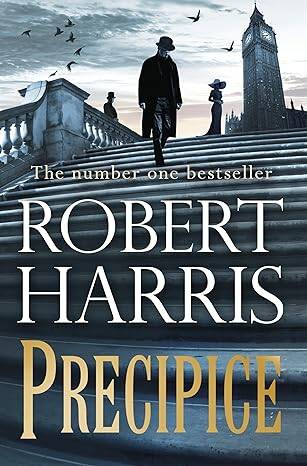
Mini Review
Harris fictionalises Asquith’s affair with Venetia Stanley amid World War I, using real letters to fuel a tale of passion and political ruin. His dialogue crackles with Edwardian dread.
Quote
'Her letters held him, as war tore all else apart'
For Authors
Harris’s epistolary pacing, using letters as plot engines, sharpens historical fiction. Use correspondence to reveal era-specific tensions and propel your story.
Lessons by Ian McEwan
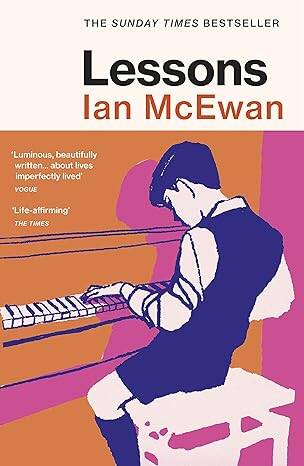
Mini Review
Roland Baines drifts through decades – from piano lessons scarred by abuse to marital fractures and global upheavals – grappling with regrets amid Chernobyl, the Wall's fall and Brexit. McEwan's epic-in-miniature charts one man's ordinary failures against history's roar with unflinching clarity.
Quote
'Things will never be as good as we hoped or as bad as we feared'
For Authors
McEwan's panoramic 'biography', with its interweaving of personal drift with era-defining events, builds cumulative resonance. Leverage it for state-of-the-nation narratives, threading intimate regrets through historical pivots for layered, reflective arcs.
Dumb Witness by Agatha Christie
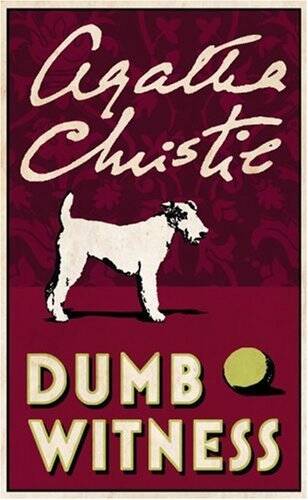
Mini Review
Hercule Poirot probes a spinster’s suspicious death, guided by her fox terrier’s instincts and a trail of family greed in 1930s England. Christie’s playful whodunit weaves misdirection with canine charm, unravelling motives through layered clues.
Quote
'Bob’s sharp bark hid clues no human eye could see'
For Authors
Christie’s animal-narrator perspective, using Bob’s behaviour as subtle clues, adds quirky depth to mysteries. Employ it for suspense, embedding non-human viewpoints to misdirect readers and enrich plot reveals.
Dubliners by James Joyce
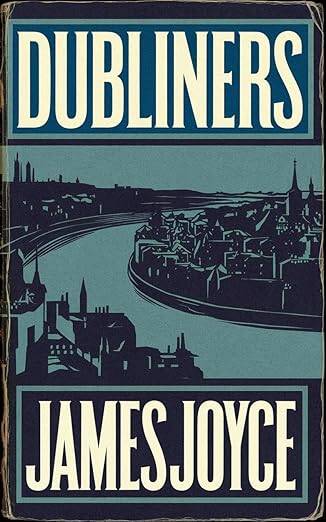
Mini Review
Joyce's fifteen linked stories map Dublin's paralysis through childhood, adulthood, and public life, culminating in 'The Dead', with its snow-shrouded revelation. His precise realism captures mundane traps with epiphanic grace.
Quote
'In the epiphany's flash, the soul stirs awake'
For Authors
Joyce's 'epiphany' technique (sudden insights amid stasis) sparks thematic depth. Apply it to short story cycles, using free indirect discourse to blend inner–outer worlds for authentic, revelatory character portraits.
The Wizard of the Kremlin by Giuliano da Empoli
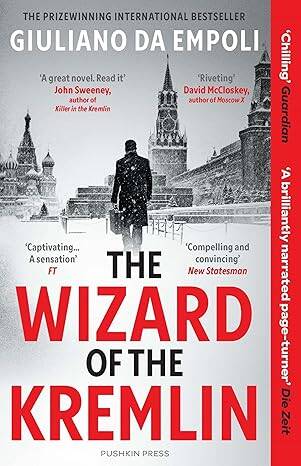
Mini Review
Vadim Baranov, Putin's shadowy spinmaster, recounts his rise from TV producer to regime architect, blending postmodern spectacle with Russia's chaotic rebirth. Da Empoli's debut dissects power's illusions through a confessional monologue laced with historical grit.
Quote
'Politics has a single purpose: to respond to man’s terrors'
For Authors
Da Empoli's insider monologue fuses memoir and satire, demystifying political theatre. Adopt it for political fiction, using cynical narration to blur fact and fabrication, heightening irony in authoritarian tales.



